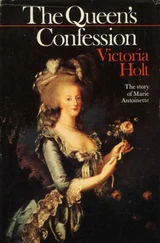Виктория Холт - The Captive Queen of Scots
Здесь есть возможность читать онлайн «Виктория Холт - The Captive Queen of Scots» весь текст электронной книги совершенно бесплатно (целиком полную версию без сокращений). В некоторых случаях можно слушать аудио, скачать через торрент в формате fb2 и присутствует краткое содержание. Жанр: Исторические любовные романы, на английском языке. Описание произведения, (предисловие) а так же отзывы посетителей доступны на портале библиотеки ЛибКат.
- Название:The Captive Queen of Scots
- Автор:
- Жанр:
- Год:неизвестен
- ISBN:нет данных
- Рейтинг книги:3 / 5. Голосов: 1
-
Избранное:Добавить в избранное
- Отзывы:
-
Ваша оценка:
- 60
- 1
- 2
- 3
- 4
- 5
The Captive Queen of Scots: краткое содержание, описание и аннотация
Предлагаем к чтению аннотацию, описание, краткое содержание или предисловие (зависит от того, что написал сам автор книги «The Captive Queen of Scots»). Если вы не нашли необходимую информацию о книге — напишите в комментариях, мы постараемся отыскать её.
The Captive Queen of Scots — читать онлайн бесплатно полную книгу (весь текст) целиком
Ниже представлен текст книги, разбитый по страницам. Система сохранения места последней прочитанной страницы, позволяет с удобством читать онлайн бесплатно книгу «The Captive Queen of Scots», без необходимости каждый раз заново искать на чём Вы остановились. Поставьте закладку, и сможете в любой момент перейти на страницу, на которой закончили чтение.
Интервал:
Закладка:
“Together . . . .” he murmured ecstatically.
“Listen,” she said.
She had heard the sound of angry voices and hurrying footsteps.
Sir William was saying: “You fool! How dared you leave your post?”
Mary whispered: “It would be better if we were not seen talking together . . . my friend.”
She went quickly into her room, shutting her door behind her.
Sir William, his face purple with anger in which fear mingled, confronted his brother. Behind him the soldier sheepishly followed.
“What is the meaning of this?” cried Sir William.
“The fellow was eager to join the revelers. I thought to give him a little respite,” answered George.
“You young idiot!” cried Sir William. “You talk as though it is some drunken soldier we are guarding for the night. Don’t you realize who our prisoner is? Why . . . at such a time she might attempt to escape. And you send the guard out to enjoy himself!”
“While I took his place.”
“So you are the young philanthropist!” muttered Sir William. He opened the door of the Queen’s chamber and looking in saw the prisoner with her two women gazing through the barred window.
Mary said: “Good day to you, Sir William.”
Sir William returned her greeting and shut the door.
“Sentinels who desert their posts pay with their lives,” he warned the soldier. “It is well that I am in a lenient mood this night.”
The soldier did not speak but stood at attention.
“Come with me,” said William to his brother.
He took him up the stairs to a small room on the next floor. There he spoke to him very severely, reminding him of the importance of guarding the Queen, of the attempts which would very likely be made to help her escape. What George had done was folly. What did he think their half-brother Moray would do if they were so foolish as to let Mary escape? In such an event their lives might not be worth very much.
George was not really listening. He could think of nothing but the Queen as she had stood there smiling at him, her long chestnut hair rippling over her shoulders; her deep-set eyes, which were a little darker than her hair, so melancholy and sad when he had seen her talking to the soldier, and sparkling with something like pleasure when he had told her of his devotion. He thought of that exquisite face which was a perfect oval, that straight nose, the mobile mouth and the white teeth which showed when she laughed.
He was in love. A thought which made him shudder with delight. To be in love did not mean the same to him as it did to Ruthven. He longed to prove his chivalry; he wanted to lay down his life for her. She was his first love and he was certain that she would be his last.
“For the love of God do not act so foolishly again,” Sir William was saying.
“No, brother,” he answered, but he was not thinking of what he said—only of her.
“Then go away and remember it,” retorted Sir William.
George came from his brother’s room and went to his own. He threw himself down on his bed and began to go through everything that had happened. He remembered every word she had said.
For a while—a very short while—he would give himself up to this delightful reverie and then he would begin to work out a plan.
The door of his room opened very slightly; Willie came in and stood at the end of his bed.
“Your Majesty,” he mimicked, “I would willingly give my life to satisfy your desire.”
George started up to stare in dismay at the mischievous urchin. “Where were you?”
“That’s telling.” Willie made a deep bow. “Ever since they brought you to the castle I have longed to serve you.”
George was out of bed, but Willie was nimble. He was out of the room and George heard his mocking laughter floating back to him.
It was no use pursuing him. One could never be sure where Willie got to. But how much had he heard? And what would he do about it?
George went back to his bed and threw himself on it. He did not believe he had anything to fear from Willie. There had always been a bond between them. They were friends. Often he had helped Willie to escape a whipping. They never mentioned this bond—but it was there, and they both knew it.
Willie’s object was solely to tease. He would tell no one else of what he had seen and heard pass between George Douglas and the Queen.
The door opened again and Willie’s grinning face looked around it.
“Willie!” cried George without rising.
Willie was alert, ready to run. “Yes, Geordie Douglas?”
“You’ll not tell a soul what you heard?”
Willie put his finger to his lips and looked very profound.
“It’s important. I mean it.”
Willie gave one of his winks and drawled: “Ay, but she’s a bonny lass. Geordie Douglas, you’re not the only one who thinks so.”
Then he was off, whistling.
Willie was trustworthy. George went back to his dream of delight.
IT HAD BEEN one of the happiest days for Mary since her incarceration had begun. That morning a large box had arrived, which had been sent on the instructions of Sir Robert Melville.
Lady Douglas and Sir William came to her chamber to see it while it was unpacked, being suspicious as to what such a box might contain.
Mary’s spirits rose as she read the letter from Sir Robert Melville which accompanied the box, and which stated that, being sure she missed the comforts to which she was accustomed, he was therefore having a few things sent to her from Holyrood.
Smiling with pleasure, Mary called Jane Kennedy and Marie Courcelles.
“This can only mean that Melville regrets his treatment of me,” she explained. “He is anxious to let me know that he dissociates himself from that brute Lindsay. It’s a good sign.”
It was then that Lady Douglas entered; she was a bright-eyed woman in spite of her advancing years, and could not hide her curiosity as to the contents of the box. If it were not for the fact that she knew Mary’s incarceration to be of such importance to her beloved son Moray, she would have been entirely sympathetic toward the Queen.
“I pray you be seated, Lady Douglas,” said Mary. “I can see you are as curious as I am to know what the box contains.”
“I crave Your Majesty’s pardon for intruding,” whispered Lady Douglas. “But . . . ”
“I understand,” said Mary. “You, like everyone in the castle, must obey the orders of those who now govern us.”
Lady Douglas lifted her shoulders resignedly. She had enjoyed her life, and the most exciting period was when she had been mistress to Mary’s father. When after his death she had married Douglas of Lochleven, life had continued to be good. She had a large family on whom she doted; she would never be lonely and life would never lose its zest for her because there would always be some son or daughter on whom her affectionate hopes would be fixed. She had borne thirteen children—six to James V and seven to Douglas. Her favorite was James Stuart, Earl of Moray, the man of destiny; but the others, like her dear Geordie, were more comfortable to live with.
As for Mary there was a resemblance to her father in her face, which warmed Lady Douglas’s heart every time she looked at her, and brought back memories that made her feel young again.
Jane Kennedy was bending over the box, drawing out a pair of black velvet boots trimmed with marten.
Mary gave a cry of delight: “Oh, how glad I am to see them again.”
Marie Courcelles held up a cloak of red satin also trimmed with marten.
Mary snatched it and wrapped it around herself. “Now I am beginning to feel alive again!” she declared.
Sir William who had joined his mother looked on and his expression was sardonic. He would have liked to depart, but how could he know what might be hidden among all the fripperies!
Читать дальшеИнтервал:
Закладка:
Похожие книги на «The Captive Queen of Scots»
Представляем Вашему вниманию похожие книги на «The Captive Queen of Scots» списком для выбора. Мы отобрали схожую по названию и смыслу литературу в надежде предоставить читателям больше вариантов отыскать новые, интересные, ещё непрочитанные произведения.
Обсуждение, отзывы о книге «The Captive Queen of Scots» и просто собственные мнения читателей. Оставьте ваши комментарии, напишите, что Вы думаете о произведении, его смысле или главных героях. Укажите что конкретно понравилось, а что нет, и почему Вы так считаете.










